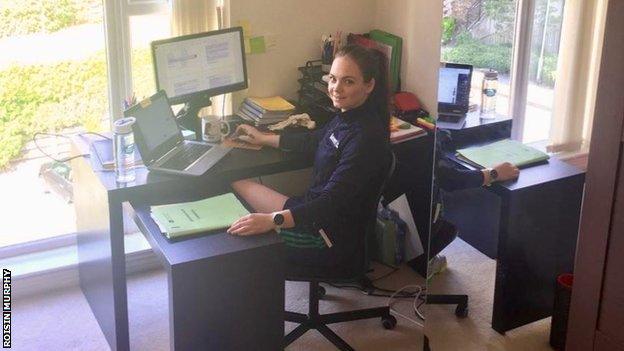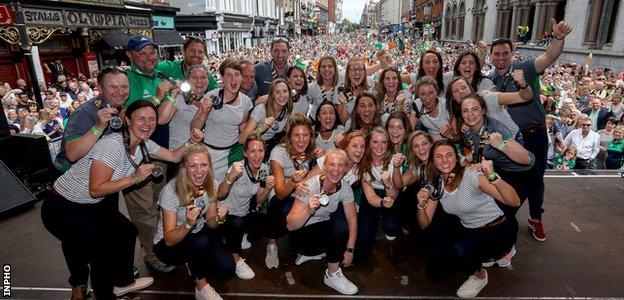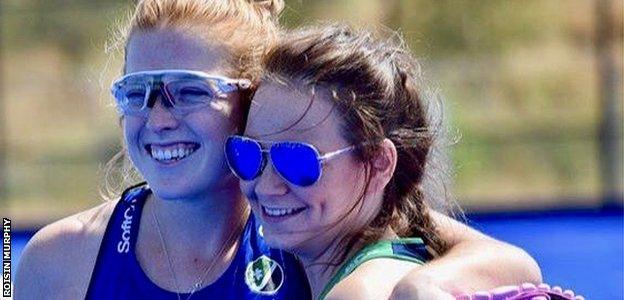Irish hockey: Physiotherapist Roisin Murphy on adapting the role amid social distancing
- Published

The lockdown has forced Murphy to adjust the way she works as she swaps face-to-face meetings with athletes for a home office
Sport Re-run: Live Like Legends |
|---|
Date: Sunday, 7 June Airing: 20:15 BST |
Coverage: BBC Two Northern Ireland and BBC iPlayer |
Throughout the Covid-19 lockdown we've heard a lot from athletes about how they've been coping with everything from the lack of training facilities to the Olympics postponement.
But what about the group of committed individuals who in normal times are responsible for making sure Northern Ireland's top sports stars can compete at the highest level?
Sport NI Sport's Institute Physiotherapist Roisin Murphy works with a number of athletes but since the start of 2018 has been an integral member of the Ireland Women's Hockey backroom team.
Murphy been with the team for their World Cup silver medal winning campaign and the history-making Olympic qualification last November.
Like everyone else the 33 year-old has been in lockdown since March, living in Belfast and unable to return to her home village of Silverbridge in County Armagh where she regularly plays football for her local GAA club.
In literally a 'hands-on' job she has had to be innovative and find new ways to liaise with the athletes she is used to seeing on a daily basis.
"The restricted ability to assess an injury can be tricky," admits Murphy.
Sport Re-run - Ireland's Hockey Journey
"We rely on our hands, our touch and our eyes to pick up what can sometimes be very subtle things when assessing an athlete and doing this remotely has really challenged the way I work.
"However positively in our profession there is a lot of evidence based literature to support accurate diagnosis from what athletes are telling you and how they describe their pain and functional abilities.
"The power of communication cannot be emphasised enough and although you are losing the nonverbal across a computer screen it forces you to listen more as a clinician which in a hectic work, training and travel schedule can be unappreciated."
'The aim is to return the athlete to the field, better than before'
The Irish hockey squad last trained together at the beginning of March and since then they have been isolating from Ballymoney to Limerick and from Belfast to Dublin, working to individual plans drawn up by Murphy.
"Each athlete is completely different," she explains.
"You could have two injuries that look exactly the same on an MRI and clinically on assessment but how they react to treatment and rehabilitation can be completely different.
"It depends on a number of variables; previous injury history, weakness somewhere else in the body, baselines strength and fitness and training age to name a few.
"The positional demands of the athlete must also be taken into consideration and rehabbed accordingly. Some athletes could cover 45km in a week and 6km of this would be high speed running and others won't ever hit or need to hit that threshold.

Murphy was a key part of the Ireland set-up when the team reached the World Cup final in 2018
"Athletes with specialisms such as drag flicking will need specialist programs that cater to this unique skill.
"Most importantly the athlete themselves are central to all of this, their behaviours, beliefs, expectations, stress and work/life balance will all effect how they interpret, cope with and return from injury.
"The aim isn't just to get someone back on the pitch playing again, we aim to return an athlete from injury to their pre-injury level of performance or better."
"In order for the relationship to work the athlete has to be responsive and in the case of the hockey squad that hasn't been a problem.
Murphy adds: "This is a fantastic group to work with, they love hockey, they give it their all, and they are always questioning things and keen to improve.
"They have all taken to the task of replicating a high performance training environment at home as much as possible.
"They are used to top class facilities in SNISI and Sport Ireland and have shown a great ability to adapt and still get the work done.
"In a situation with so many unknowns and undoubted stress in and away from sport they continue to train individually and keep good spirits.
"They are a great source of support for each other and a motivation for anyone working with them."
Constant communication in rehab
Ulster's Zoe Wilson has been rehabbing a knee injury since helping Ireland qualify for the Olympics last November.
"When I injured my knee, throughout the rehab I think I saw more of Roisin than my own family," Wilson laughs.
"We've had a lot of communication with her since we have been in lockdown (some of us more than others). She has been providing us with individual 'work-ons' to help make us more robust for when we return to the pitch," she explains.

Murphy has been working closely with Ireland international Zoe Wilson as she continues to recover from a knee injury
"Roisin is a top-class physio that works with the utmost professionalism but has the ability to have a laugh when the time is right.
"She always goes above and beyond to make sure everything is just right for each athlete personally and their program.
"She has introduced us to a side of physio that I believe has brought us to the next level, by making us aware of the importance of both pre-hab and rehab programmes which allows us to increase the intensity of our hockey program."
Being able to gather together and get back to socially distanced training may hopefully only be a few weeks away and as well as looking forward to getting back on the pitch with the team, Murphy is also making plans as to how her job might look for the foreseeable future.
"The current social distancing guidelines have meant a significant shift in our way of working, with telecommunication the primary method of clinically interacting with the athletes," Murphy says.
"I thoroughly enjoy my work and love the social interaction of working with people and teams, but I can see a lot of positives in my work situation in the past few months, the ability to look at the bigger picture, review and reassess.
"The different methods of communication and the importance of each one of them. The benefit and many uses of technology through the novel use of Tele-consultation and rehabilitation.
"I have used videos, pictures and even apps to build programs to educate and communicate with athletes, trialling and tailoring various methods of communication depending on the audience.
"I can see a lot of these ways of working will still be beneficial post-Covid-19."
And when, hopefully, the Irish Women get to make their Olympics debut in Tokyo next summer, it's clear they will be as well prepared as any nation.